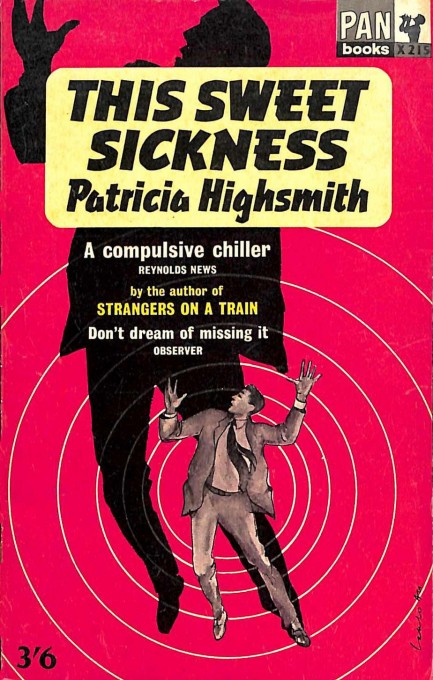| Vintage Pulp | Aug 5 2019 |

He'll make you love him even if it kills you.

Patricia Highsmith's reputation demands that you read any book of hers you find, so when we ran across This Sweet Sickness we knew it would be good. Originally published in 1960 with this paperback coming from British publisher Great Pan in 1963, she tells the story of another troubled man à la her famous Tom Ripley novels. Here we have David Kelsey, in love with a woman who, inconveniently, is married. No problem, though, because obstacles mean nothing. He's determined to win his prospective love's affections, ignoring the fact that she's both unavailable and uninterested.
The book is told from the perspective of this dangerously deluded man, and his mental dissonance, deftly written by Highsmith, is cringe inducing. In Kelsey's head, everything is proof his love is returned. When the woman he desires is kind, it encourages him. When she's resistant, he assumes she isn't acting of her own accord, but instead is being pressured by her husband. There's nothing she can do—literally nothing—to dissuade Kelsey from the idea that his love for a woman obligates her to love him back. It all leads pretty much where you expect—to conflict, terror, death, and the high, lonely ledge of insanity.
It's fascinating to us that the U.S. born Highsmith was unappreciated in her own country, despite her breakthrough at age twenty-nine with Strangers on a Train. Well, considering she spent her life writing novels while residing mainly in France and Switzerland, we doubt she suffered much from the neglect. She's well remembered as an author now, though less so as a person, since she had views that were eyebrow raising even in the context of her era. But This Sweet Sickness is an interesting and relevant book, and we highly recommend it.
The book is told from the perspective of this dangerously deluded man, and his mental dissonance, deftly written by Highsmith, is cringe inducing. In Kelsey's head, everything is proof his love is returned. When the woman he desires is kind, it encourages him. When she's resistant, he assumes she isn't acting of her own accord, but instead is being pressured by her husband. There's nothing she can do—literally nothing—to dissuade Kelsey from the idea that his love for a woman obligates her to love him back. It all leads pretty much where you expect—to conflict, terror, death, and the high, lonely ledge of insanity.
It's fascinating to us that the U.S. born Highsmith was unappreciated in her own country, despite her breakthrough at age twenty-nine with Strangers on a Train. Well, considering she spent her life writing novels while residing mainly in France and Switzerland, we doubt she suffered much from the neglect. She's well remembered as an author now, though less so as a person, since she had views that were eyebrow raising even in the context of her era. But This Sweet Sickness is an interesting and relevant book, and we highly recommend it.




































































